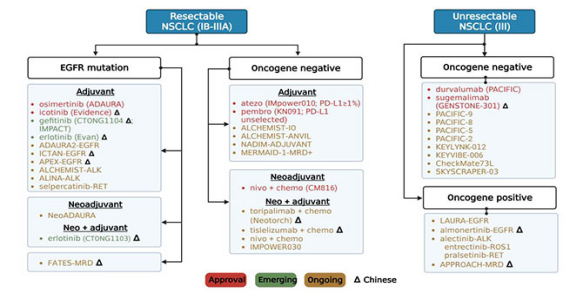

Recently, Prof. Wu Yilong’s team from Guangdong Provincial People’s Hospital published an article titled “Emerging evidence and treatment paradigm of non-small cell lung cancer” in the journal of oncology Journal of Hematology & Oncology (CAS Q1, impact factor: 23.168) published by BioMed Central (BMC) under Springer Nature in collaboration with Prof. Li Yangqiu’s team from Jinan University. This article focuses on the latest therapeutic model for non-small cell lung cancer (NSCLC) and, more importantly, points out that clinical trials are expanding constantly in width and depth at an unprecedented pace. In addition, for urgent clinical problems, it delves into research that may change the clinical guidelines for NSCLC in the next five years, and provides unique insights into the development directions of clinical research on NSCLC. It includes research in China, fully reflecting the diversity and universality of its scope of argumentation. The important authors of this paper include postdoctoral fellow Liu Siyang from Jinan University, postdoctoral fellow Zheng Meimei from Guangdong Provincial People’s Hospital, Pan Yi, Director of the Department of Radiotherapy, Guangdong Provincial People’s Hospital, and Dr. Liu Siyang from the Department of Pulmonary Surgery, Guangdong Provincial People’s Hospital.
The evolution and breakthrough of the therapeutic model for advanced NSCLC bring the hope of long-term survival to patients, and this model has been extended constantly to the early and locally advanced stages in recent years, thereby optimizing the treatment management of these patients to further improve their survival. The ADAURA study, the international Stage III study Checkmate816, PACIFIC, etc. led by Prof. Wu Yilong have established precise management during the perioperative and locally advanced stages, and the results of the breakthrough research design, such as Gemstone-301, have also rewritten the guidelines. In the new paradigm, more clinical problems are emerging and need to be solved urgently, including establishing the position of adjuvant chemotherapy, individualized adjuvant therapy guided by MRD, and clarifying the role of induction therapy in unresectable Stage III NSCLC. These problems bring challenges but also imply new opportunities. In the next five years, there will be more highly-anticipated innovative clinical research designs and results, and existing survival outcomes are expected to be surpassed.

For advanced NSCLC, the existing precise treatment thought is still developing, with more attention paid to the further exploration of certain special metastatic states, new molecular targets, and immune checkpoint inhibitors. Oligometastasis is a relatively confined state of metastasis, and is more finely defined and classified in the age of precision treatment. The introduction of local consolidation therapy improves the survival of advanced stage patients, and even “cures” some patients; second, there are more and more mutation sites that can be targeted precisely, providing more patients with effective clinical therapeutic schemes, reflecting that precise therapeutic strategies for lung cancer are fully booming; the field of immunotherapy is even more flourishing, especially as China is becoming a main force in global clinical development, including CHOICE-01, GEMSTONE302 research, etc., which push locally developed immunotherapeutic drugs in China to the forefront; exploration is also being made gradually into combined therapeutic models, and special groups such as brain metastasis and driver gene-positive patients. In the future, we will continue to define biological markers, expand target sites, overcome drug resistance, and break through existing survival boundaries with a focus on the biological mechanisms of NSCLC.
“We have also predicted that research on lung cancer will continue to develop, and the survival rate and quality of life of patients will also keep improving accordingly,” the article writes at the end. This is exactly what the Guangdong Lung Cancer Institute has been striving for, namely multidisciplinary research on single diseases, and constant exploration and innovation in scientific research, all for patients. So far, the team has published 363 SCI papers as a first (joint) or corresponding author, and its serial research findings have been incorporated into lung cancer guidelines in multiple countries and regions such as China, the U.S., and Europe; the Guangdong Lung Cancer Institute has undertaken 73 national, provincial and ministerial level projects, and 210 clinical trial projects. Prof. Wu Yilong has been included in the “Global Highly Cited Scientists” list for five consecutive years from 2018 to 2022. In the national top 100 list of lung cancer experts in academic influence released by Globalauthorid, Prof. Wu Yilong has ranked first twice, and Prof. Zhong Wenzhao, Prof. Zhou Qing, Prof. Yang Jinji, and Prof. Zhang Xuchao rank 12th, 27th, 31st, and 91st, respectively. In the future, the Guangdong Lung Cancer Institute team will continue to forge ahead with their solid clinical and scientific research and innovation capabilities, focus on research that will change clinical practice in the future, and amplify the voice of China.
Zheng Meimei, Gan Bin
Updated: May 12, 2023